What Is Patreon? A Creator’s Guide To Making Money in 2022
So your podcast audience has exploded, but the revenue from those fancy sock ads isn’t exactly covering rent yet. Or maybe you’re tired of social media algorithms hiding your content from even your most dedicated followers. Enter Patreon, a platform that makes it easy for content creators to monetize their online following!
With Patreon, users can launch a personalized subscription-based site in just a few easy steps, allowing creators to offer exclusive content to subscribers and generate a consistent monthly income.
Our Patreon deep-dive will help you learn the ins and outs of this platform and determine whether becoming a Patreon creator is the right move for you.
Bonus: Download a free, fully customizable influencer media kit template to help you introduce your accounts to brands, land sponsorship deals, and make more money on social media.
What is Patreon?
Patreon is a membership platform that allows creators to run a subscription service for their content. Instead of setting up their own website and payment platform, creators can easily launch a personalized Patreon page in a few steps.
On Patreon, paying subscribers are called patrons. Each patron pays a fee for exclusive content from creators.
Patreon launched in 2013 and has over 3 million monthly active patrons and more than 185,000 registered creators. As of spring 2021, Patreon was valued at $4 billion.
Creators can offer subscriptions for a variety of services. Popular content formats include:
- Video (38% of creators)
- Writing (17%)
- Audio (14%)
- Photography (6%)
The Patreon app is also available for iOS or Android.
How does Patreon work?
Patreon allows creators to monetize their content by creating a paywall and charging patrons a subscription fee to access their work. This transparent business model is great for both creators and patrons.
Creators know when their monthly earnings will be paid out and can rely on this income to support their work. In addition, patrons can see exactly how their subscription supports the creator and upgrade or cancel their membership with the click of a button.
So what is Patreon used for? Creators can use the Patreon platform for all types of content:
Writers might share short excerpts of stories with their Twitter followers. Then, to drive readers to their Patreon, they can let them know that the full piece is available by subscribing to one of their membership tiers.
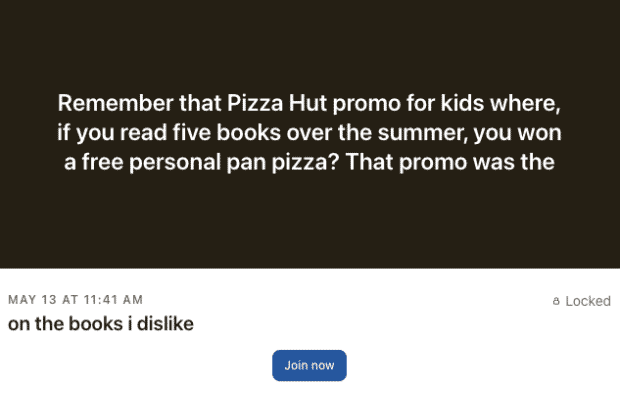
Source: patreon.com/raxkingisdead
Photographers who post examples of their work on Instagram can use Patreon as a vault for their content. They can also entice patrons by offering special perks like physical prints of their favorite images.


Source: patreon.com/adamjwilson
Podcasters can easily engage with their listeners on Patreon. The Community tab functions as a messageboard, where patrons can leave messages and chat with other listeners as well as the podcast hosts. Patrons might get early access to episodes or receive special content like bonus episodes or a look behind the scenes.
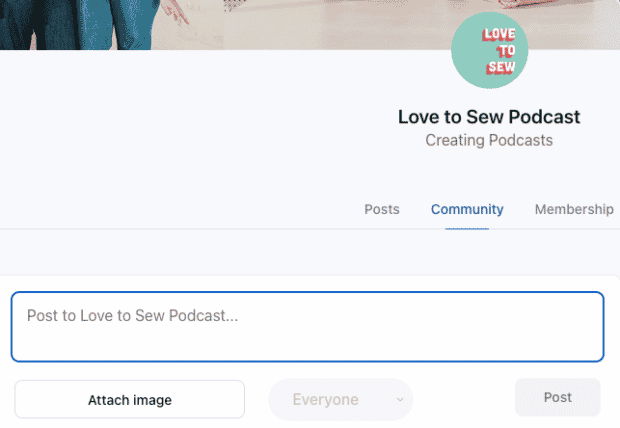

Source: patreon.com/lovetosew
Musicians can post new tracks ahead of their release date or share b-sides and demos with fans.
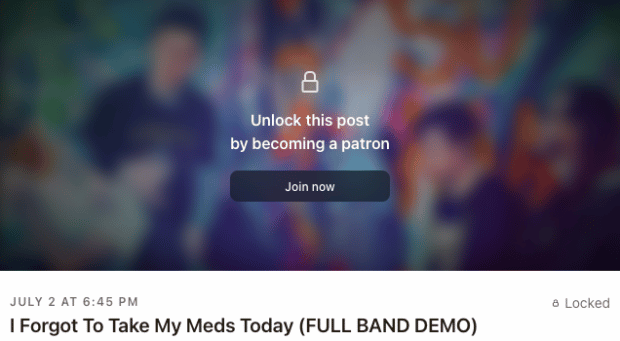
Source: patreon.com/pdaddyfanclub
Performers and streamers can also take advantage of Patreon’s secure, private livestream feature to charge a fee for an online performance.
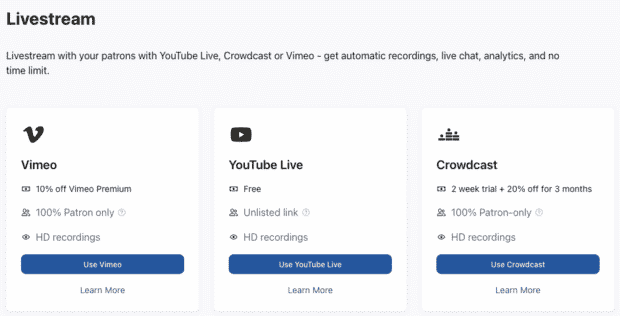
Source: patreon.com/posts/livestream
In general, Patreon is a great opportunity for new creators to build a community and widen their reach, while high-profile or celebrity creators can use Patreon to interact with fans in a whole new way.
How much can I earn on Patreon?
The platform is flexible enough to accommodate creators of all followings, so average Patreon income varies.
How much of your existing audience will convert to Patreon subscribers depends on many different factors, including:
- The type of content you create
- The perks you offer to patrons
- Your membership tier fees
- The size of your current audience
- Your marketing efforts
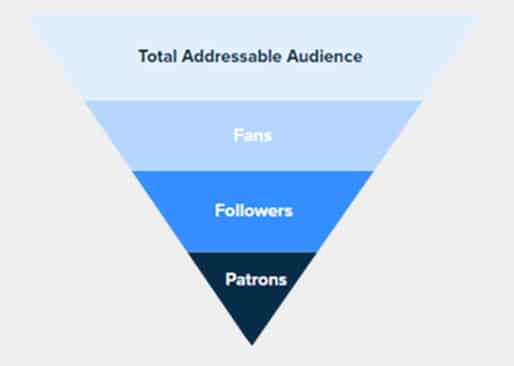
Source: blog.patreon.com/figuring-out-how-much-you-might-make-on-patreon
So, how much can you expect to earn? We’ve put together a hypothetical example based on a creator with 10,000 followers on Instagram (their primary social channel).
| Total size of following | 10,000 (Instagram) |
| % of “passionate” followers (who would click through to learn more) | 10% |
| Traffic from Instagram to Patreon page | 1,000 |
| % of traffic that converts into patrons | 1-5% (10-50 patrons) |
| Average value of each patron | $5 |
| Total monthly Patreon income | $50-$250 |
If that doesn’t sound like much, keep reading. We’ve got tips to help you grow your fan base and increase your Patreon earnings.
How do I start a Patreon page?
The process of signing up as a Patreon content creator is simple. Go to patreon.com/create to get started:
1: Select a category that describes your content
You can pick up to two categories:
- Podcasts
- Illustration & Animation
- Music
- Communities
- Local Business (restaurant, yoga studio, venue, etc.)
- Videos
- Writing & Journalism
- Games & Software
- Photography
- Other
2: Does your work contain 18+ themes such as real or illustrated nudity?
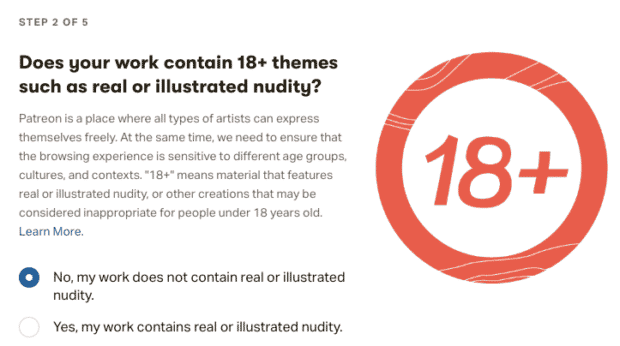
This question will require you to answer Yes or No based on the type of content you plan to offer.
3: Pick your currency
Patreon offers 14 currencies to choose from, including USD, CAD, Euro, GBP, AUD, and more. Your memberships will be priced and paid out in the currency you choose.
4. Do you want to offer exclusive merchandise?
For an additional fee, Patreon can handle merchandise production, global shipping and support. This question will require you to answer Yes or No to continue. You can always select No at this stage and add merch to your plan later on. (Don’t worry, we discuss this in more detail later on)
5. Want to reserve a custom URL for your Patreon page?
To do so, you must connect at least one social media account (Facebook, Instagram, Twitter, or YouTube) so that Patreon can verify your identity as a creator. This will allow you to set a custom URL for your Patreon, such as patreon.com/hootsuite.
Your Patreon page is almost ready to launch!
How do I customize my Patreon page?
After you’ve completed the initial set-up, the page editor will take you through a few more steps to customize your page.
Start with the basics
Once you’ve created your Patreon account and verified it via email, you can start building your page.
First, give your Patreon page a name, then create a headline. Your headline should be a short description of your content that tells people what you do, like “creating weekly podcasts” or “writing essays.”
Upload images
Next, you’ll be prompted to upload a profile photo and cover image. Patreon requires every account to have two photos. These are the recommended formats:
- Profile picture: 256px by 256px
- Cover image: at least 1600px wide and 400px tall
Write a compelling About section
Your Patreon About section is the first thing potential patrons will see when they land on your page, so be sure to paint a compelling picture.
A good About page will follow this basic structure:
- Introduce yourself. Who are you and what do you do?
- Explain what your Patreon is for. Why are you using Patreon to support your creative career?
- Explain how the funds will be used. How will you use the money you earn on Patreon to continue creating? Patrons appreciate transparency, so be as clear as you can.
- Thank readers for checking out your Patreon. Share your enthusiasm for the future of your work!
You can also embed an image or add an intro video to this section. Visuals are helpful because they allow patrons to see exactly what they will get when they subscribe.
Select your tiers
Start by choosing a fully customizable tier starter kit based on the type of content you offer (video, music, podcasts, visual art, writing, local business, all creators).
Patreon will then recommend starter tiers based on your selections. These tiers are fully customizable and can be tailored to your preferences.
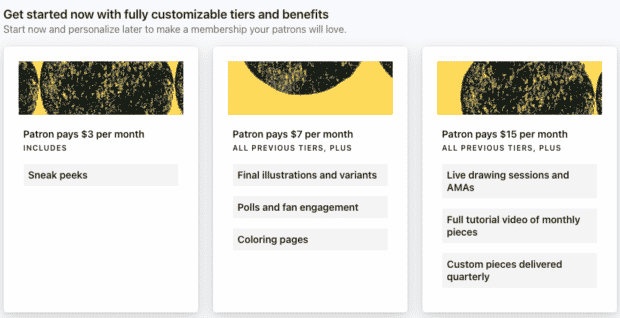
For example, these are a few of the recommended tiers for Illustrators & Comics. Patreon has a customizable starter kit available for every type of content.
Decide if you want to offer merch
Patreon can also help you offer exclusive merch items to your subscribers.
The platform allows you to customize your items (like stickers, mugs, tote bags, apparel, and more!) and select the tier(s) that will receive exclusive merch. Patreon then handles the production, shipping, tracking, and support.
Connect your socials
Linking social media accounts to your Patreon helps confirm your identity so your patrons can subscribe with confidence. You can link Patreon to Facebook, Instagram, Twitter, and YouTube.
Set up payment
As a creator, this is probably one of the most important steps. Let’s make sure you get paid!
You’ll need to provide the following payment information to receive your Patreon payouts:
- Payment schedule (either monthly or per creation, depending on your plan)
- Your currency
- Payout settings (how you’d like to get paid and tax information)
Select your Page Settings
Almost done! Patreon requires a few more pieces of information to get started.
Bonus: Download a free, fully customizable influencer media kit template to help you introduce your accounts to brands, land sponsorship deals, and make more money on social media.
Get the template now!You’ll add basic account info at this stage, like your legal name and country of residence. This account information will not appear on your public page. You’ll also set a few visual preferences, like the color you want to use for the links and buttons on your page.
This is also when you’ll determine how transparent you want to be as a creator. You can choose to make your earnings and number of patrons visible to all page visitors. Patreon recommends making this information public, but it’s up to you.
You’ll also be asked whether your work contains any adult content. Patreon does allow adult content on the platform, as long as it conforms to their terms of use. Just be aware that if your page is marked as adult content, it won’t come up in the Patreon search results.
Preview your page, then hit the launch button!
Congratulations! You’ve officially launched your Patreon.
Note: Patreon reviews your content when you launch. Reviews usually take minutes, although some content takes up to 3 days to review. You can continue editing your page after you launch.
What can creators share on Patreon?
You can create the following post types:
| Text | Choose a compelling title, then type away! Text posts allow you to embed one or more images within the text or upload attachment files for your patrons to download. |
| Images | Image posts allow you to upload photos or embed image URLs from other sites. This post type automatically generates a gallery when you upload multiple photos. Patreon supports multiple photo formats, including .jpg, .jpeg, .png, and .gif file types up to 200 MB. |
| Video | To create a video post, you can paste a video URL from another site or connect Patreon directly to your Vimeo Pro account. Patreon supports embedded YouTube or Vimeo links. |
| Livestream | Patreon supports livestreaming via Vimeo, YouTube Live, or Crowdcast. Creators get access to automatic recordings, live chat, analytics, and no time limit. Note that some of these options carry an additional fee. |
| Audio | Audio posts allow you to upload files or embed audio URLs from other sites. You can also upload a thumbnail image for your file, such as album art. Patreon supports .mp3, .mp4, .m4a, and .wav; file size must be 512 MB or less. |
| Link | Insert the link you’d like to share with your patrons. The post will display a preview of your link. Write a description in the text field below to explain why you’re sharing this link with your audience (ex. Sharing your website or Instagram profile). |
| Polls | All Patreon membership tiers can run polls, which is a great way to get feedback from your patrons and learn how you could grow your subscriber base. Select a minimum of 2 poll options, or add up to 20 options for patrons to choose from. You can set an expiration date and check the poll results anytime, and you can also export the results as a CSV file. |
Every post type allows you to add tags to your post so patrons can easily search by category (for example, “monthly update” or “bonus episode”). You can also choose who can see this post (public, all patrons, or select tiers).
You might have special or time-sensitive content to share with your patrons. In that case, you can create an early access post to allow select tiers to see it before anyone else. You can even add special fees to access a particular post if needed.
Advanced post types include:
| Welcome Notes | Send your patrons a personal welcome note & email when they join. This can be customized for each subscription tier. You can add or remove this feature at any time. |
| Goals | These posts give you an opportunity to describe what you’re working on and help patrons understand how their subscription supports your creative work. You can set two types of goals: Earnings-based (“When I reach $300 per month, I will …”) or community-based (“When I reach 300 patrons, I will …”) |
| Special Offers | Create your own personalized offer to draw in patrons and give them access to exclusive content. You can choose from existing benefits, such as custom stickers, early-access tickets, and 1:1 chats, or design an offer that best represents your work. |
How much does Patreon cost?
For Creators
Creating a Patreon account is free for creators, but fees apply after creators start earning money on Patreon. Creators can expect to pay between 5-12% of the monthly income they earn on Patreon, depending on their plan type.
Patreon currently has three plans available: Lite, Pro, and Premium.
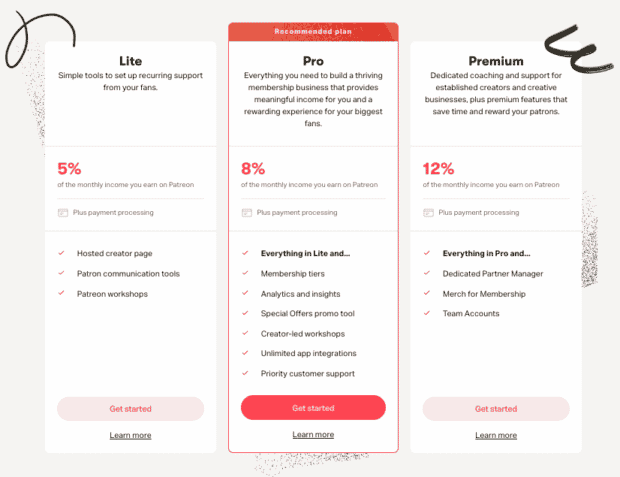
Payment processing fees also apply.
For Patrons
Creating a Patreon account is free. However, monthly subscription fees will vary depending on which creator(s) patrons subscribe to and which membership tier they select.
Creators set their own membership tier structure. Some creators charge a flat fee:
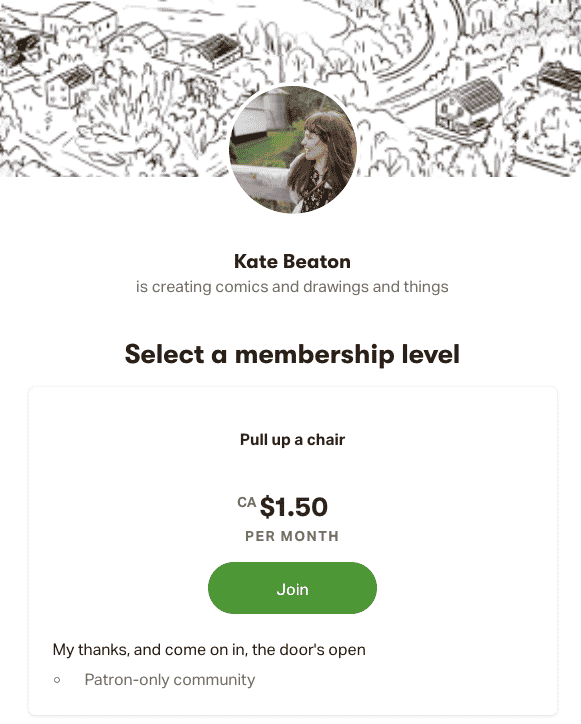
Source: patreon.com/katebeaton
Other creators operate a tiered pricing structure that offers more perks to patrons who pay a higher fee:
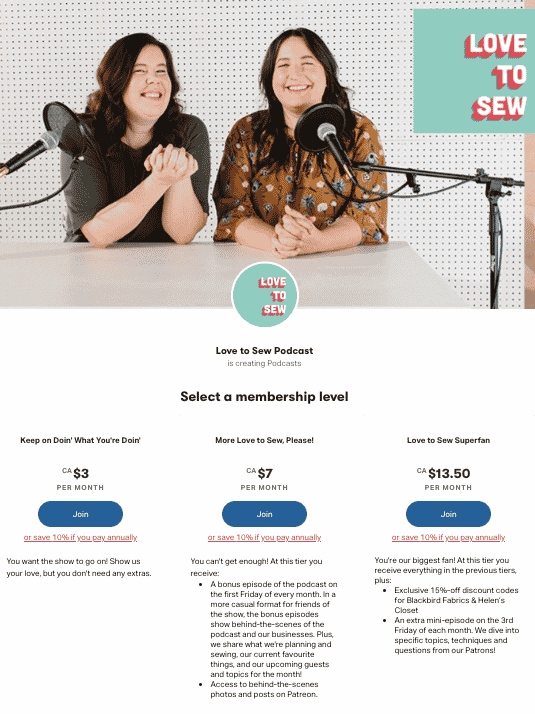
Source: patreon.com/lovetosew
Patrons can upgrade or downgrade their subscriptions at any time. It’s also pretty easy to cancel if they no longer wish to access the content.
How can I make more money on Patreon?
If your Patreon needs a little help getting off the ground, it’s time to get strategic. Here’s how to grow your Patreon income using a multi-pronged approach.
Expand your total addressable audience
Start by focusing on growing your following on other social media platforms (like Instagram, Twitter, YouTube, etc.).
If you don’t have a presence on multiple platforms, now’s the time to start! Expand your marketing strategy to ensure that you are reaching as many potential subscribers as possible.
Not sure where to get started? Check out our guide to the newest social media apps and platforms for inspiration.
Grow your percentage of “passionate” followers
Create a video or text post to tell your story and build a personal connection with followers. Explain how supporting your Patreon page benefits you as a creator, and describe how your Patreon income allows you to create more content or gives you the flexibility to be more creative.
Drive traffic to your Creator page
Mention your Patreon page everywhere: add a link to your social media bio(s), bring it up in podcasts or interviews, and include a link in your monthly newsletter or e-blast. Repetition will help drive traffic, and increased traffic can result in higher conversion from potential subscriber to patron.
Use free content to convert traffic into patrons
Free content is a great way to entice potential patrons. Give visitors a sneak peek of your Patreon content to let them know what to expect if they become a patron.
Create a few public (free) posts to give potential subscribers an idea of the type of content they can expect. You can also run giveaways or special promotions to generate buzz (ex. “sign up before the end of the month to be entered in the draw”).
Grow the average value of each patron by creating more membership tiers
Having multiple membership tiers can incentivize existing patrons to “level up” and pay more for their monthly subscription. Create special benefits or rewards tailored for your content type and add value for your patrons. Make sure to differentiate between your tiers so patrons can easily see what they’ll get when they upgrade.
Keep learning!
The Patreon polling feature is a great way to get feedback from your patrons and gain insight into why they subscribe to your content so you can figure out how to grow your subscriber base.
The Patreon Blog is a great resource for creators who want to learn more about running and growing a creative business or stay up to date with Patreon’s updates and new features.
Save time managing your social media presence with Hootsuite. Publish and schedule posts, find relevant conversions, engage the audience, measure results, and more — all from one dashboard. Try it free today.
Do it better with Hootsuite, the all-in-one social media toolkit. Stay on top of things, grow, and beat the competition.
Free 30-Day Trial (risk-free!)The post What Is Patreon? A Creator’s Guide To Making Money in 2022 appeared first on Social Media Marketing & Management Dashboard.
Categories
- 60% of the time… (1)
- A/B Testing (2)
- Ad placements (3)
- adops (4)
- adops vs sales (5)
- AdParlor 101 (43)
- adx (1)
- algorithm (1)
- Analysis (9)
- Apple (1)
- Audience (1)
- Augmented Reality (1)
- authenticity (1)
- Automation (1)
- Back to School (1)
- best practices (2)
- brand voice (1)
- branding (1)
- Build a Blog Community (12)
- Case Study (3)
- celebrate women (1)
- certification (1)
- Collections (1)
- Community (1)
- Conference News (1)
- conferences (1)
- content (1)
- content curation (1)
- content marketing (1)
- contests (1)
- Conversion Lift Test (1)
- Conversion testing (1)
- cost control (2)
- Creative (6)
- crisis (1)
- Curation (1)
- Custom Audience Targeting (4)
- Digital Advertising (2)
- Digital Marketing (6)
- DPA (1)
- Dynamic Ad Creative (1)
- dynamic product ads (1)
- E-Commerce (1)
- eCommerce (2)
- Ecosystem (1)
- email marketing (3)
- employee advocacy program (1)
- employee advocates (1)
- engineers (1)
- event marketing (1)
- event marketing strategy (1)
- events (1)
- Experiments (21)
- F8 (2)
- Facebook (64)
- Facebook Ad Split Testing (1)
- facebook ads (18)
- Facebook Ads How To (1)
- Facebook Advertising (30)
- Facebook Audience Network (1)
- Facebook Creative Platform Partners (1)
- facebook marketing (1)
- Facebook Marketing Partners (2)
- Facebook Optimizations (1)
- Facebook Posts (1)
- facebook stories (1)
- Facebook Updates (2)
- Facebook Video Ads (1)
- Facebook Watch (1)
- fbf (11)
- first impression takeover (5)
- fito (5)
- Fluent (1)
- Get Started With Wix Blog (1)
- Google (9)
- Google Ad Products (5)
- Google Analytics (1)
- Guest Post (1)
- Guides (32)
- Halloween (1)
- holiday marketing (1)
- Holiday Season Advertising (7)
- Holiday Shopping Season (4)
- Holiday Video Ads (1)
- holidays (4)
- Hootsuite How-To (3)
- Hootsuite Life (1)
- how to (5)
- How to get Instagram followers (1)
- How to get more Instagram followers (1)
- i don't understand a single thing he is or has been saying (1)
- if you need any proof that we're all just making it up (2)
- Incrementality (1)
- influencer marketing (1)
- Infographic (1)
- Instagram (39)
- Instagram Ads (11)
- Instagram advertising (8)
- Instagram best practices (1)
- Instagram followers (1)
- Instagram Partner (1)
- Instagram Stories (2)
- Instagram tips (1)
- Instagram Video Ads (2)
- invite (1)
- Landing Page (1)
- link shorteners (1)
- LinkedIn (22)
- LinkedIn Ads (2)
- LinkedIn Advertising (2)
- LinkedIn Stats (1)
- LinkedIn Targeting (5)
- Linkedin Usage (1)
- List (1)
- listening (2)
- Lists (3)
- Livestreaming (1)
- look no further than the new yorker store (2)
- lunch (1)
- Mac (1)
- macOS (1)
- Marketing to Millennials (2)
- mental health (1)
- metaverse (1)
- Mobile App Marketing (3)
- Monetizing Pinterest (2)
- Monetizing Social Media (2)
- Monthly Updates (10)
- Mothers Day (1)
- movies for social media managers (1)
- new releases (11)
- News (72)
- News & Events (13)
- no one knows what they're doing (2)
- OnlineShopping (2)
- or ari paparo (1)
- owly shortener (1)
- Paid Media (2)
- People-Based Marketing (3)
- performance marketing (5)
- Pinterest (34)
- Pinterest Ads (11)
- Pinterest Advertising (8)
- Pinterest how to (1)
- Pinterest Tag helper (5)
- Pinterest Targeting (6)
- platform health (1)
- Platform Updates (8)
- Press Release (2)
- product catalog (1)
- Productivity (10)
- Programmatic (3)
- quick work (1)
- Reddit (3)
- Reporting (1)
- Resources (34)
- ROI (1)
- rules (1)
- Seamless shopping (1)
- share of voice (1)
- Shoppable ads (4)
- Skills (28)
- SMB (1)
- SnapChat (28)
- SnapChat Ads (8)
- SnapChat Advertising (5)
- Social (169)
- social ads (1)
- Social Advertising (14)
- social customer service (1)
- Social Fresh Tips (1)
- Social Media (5)
- social media automation (1)
- social media content calendar (1)
- social media for events (1)
- social media management (2)
- Social Media Marketing (49)
- social media monitoring (1)
- Social Media News (4)
- social media statistics (1)
- social media tracking in google analytics (1)
- social media tutorial (2)
- Social Toolkit Podcast (1)
- Social Video (5)
- stories (1)
- Strategy (608)
- terms (1)
- Testing (2)
- there are times ive found myself talking to ari and even though none of the words he is using are new to me (1)
- they've done studies (1)
- this is also true of anytime i have to talk to developers (1)
- tiktok (8)
- tools (1)
- Topics & Trends (3)
- Trend (12)
- Twitter (15)
- Twitter Ads (5)
- Twitter Advertising (4)
- Uncategorised (9)
- Uncategorized (13)
- url shortener (1)
- url shorteners (1)
- vendor (2)
- video (10)
- Video Ads (7)
- Video Advertising (8)
- virtual conference (1)
- we're all just throwing mountains of shit at the wall and hoping the parts that stick don't smell too bad (2)
- web3 (1)
- where you can buy a baby onesie of a dog asking god for his testicles on it (2)
- yes i understand VAST and VPAID (1)
- yes that's the extent of the things i understand (1)
- YouTube (13)
- YouTube Ads (4)
- YouTube Advertising (9)
- YouTube Video Advertising (5)
